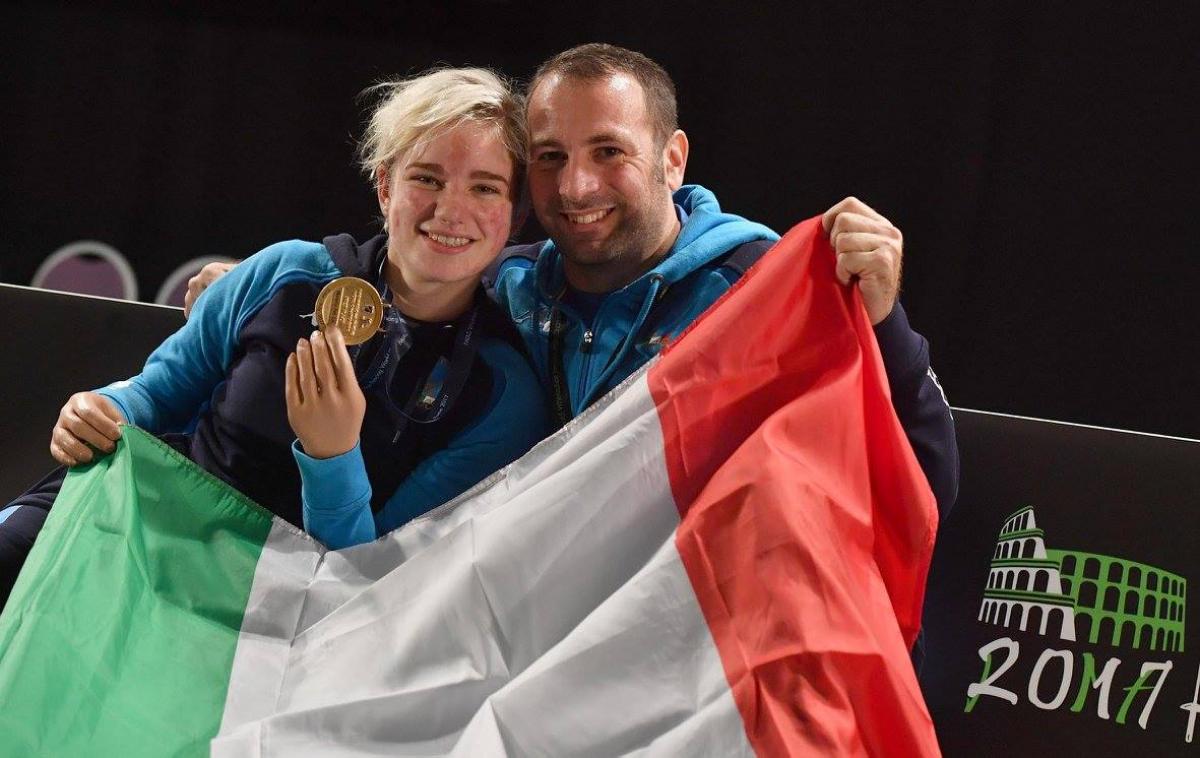Rome 2017: Five things we learned
The key stories from the Wheelchair Fencing World Championships 14 Nov 2017
Beatrice Vio celebrates retaining her world title on home soil at Rome 2017
The world’s best wheelchair fencers battled at the International Wheelchair and Amputee Sports Federation (IWAS) Wheelchair Fencing World Championships from 6–12 November in Rome, Italy. After six days of competition, here are five takeaways:
1. Bebe Vio is just unstoppable
Vio successfully defended her women’s category B foil world title in Rome, to the delight of the home crown. The achievement seals her sixth successive tournament victory, a run that goes back to gold at Rio 2016. Vio’s last defeat came against Russia’s Viktoria Boykova* at the World Cup in Warsaw, Poland, in July 2016 and ended an 11-event unbeaten run for the Italian. But in Rome, Vio breezed past Boykova to retain the world title. It is difficult to identify a challenger who can stop Vio from going on another run.
2. Quality runs throughout the Italian squad
While Vio usually steals the headlines, the host nation showed its strength in depth at the World Championships. In addition to Vio’s foil gold medal, 44-year-old Alessio Sarri also took the title in the men’s sabre category B competition. Italy’s talent as a whole was most apparent in the team events, where they won the men’s sabre and both the men’s and women’s foil titles. The results earned them second place in the medals table behind a strong Russian squad. The Italian federation will now hope to use the performance as a platform for future Paralympic success.
3. Zsuzsanna Krajnyak remains hungry for gold
As already one of the most decorated wheelchair fencers of all time, Hungary’s Zsuzsanna Krajnyak could be forgiven for taking it easy. But that is not in the 38-year-old’s nature. In fact, she is as committed as ever to taking titles, as she showed in Rome by winning world titles in both the women’s category A foil and epee events. Krajnyak and Hong Kong’s Yu Chui Yee share the honour of being the female fencers with the most Paralympic medals, but Krajnyak is yet to win gold at the Games. Few would bet against her making another bid for that elusive goal at Tokyo 2020.
4. Dimitri Coutya is more than a foil specialist
Great Britain’s Dimitri Coutya might no longer be known as a foil specialist after showing he is equally lethal with the epee in Rome. Coutya has previously said that the epee does not come to him as naturally as the foil. But the 20-year-old is now a double world champion after gold in both the men’s category B foil and epee titles. The results secure his world No.1 spot with the foil and elevate him to the top of the epee rankings as well. Coutya is now confirmed as a force to be reckoned with for rivals in both events.
5. Chunhee Park is a real contender
The men’s category C foil contest has long been dominated by two main protagonists, Ukraine’s Serhii Shavkun and Russia’s Alexander Logutenko*. The pair have shared the last five major titles. A rare challenge to the pair has previously come from Logutenko’s compatriot Sergey Barinov*. But now South Korea’s Chunhee Park represents a new contender in this competition. Park took silver in Rome, defeating Shavkun in the semi-final before losing to Logutenko by just two points in the final. If he can build on his World Championships form, contests in this classification are set to get even more exciting.
Complete results are available online .
*Editor's note: The International Paralympic Committee suspended the Russian Paralympic Committee on 7 August 2016 for its inability to fulfil its IPC membership responsibilities and obligations, in particular its obligation to comply with the IPC Anti-Doping Code and the World Anti-Doping Code (to which it is also a signatory). As a result of the suspension, Russian athletes cannot enter IPC sanctioned events or competitions, including the Paralympic Games.
On 6 September 2017, the IPC put in place a limited interim measure for athletes to compete as neutrals in qualification events across four World Para sports for the PyeongChang 2018 Paralympic Winter Games. These sports are alpine skiing, biathlon, cross-country and snowboard.
For further information please click here.

 Facebook
Facebook
 Instagram
Instagram
 Twitter
Twitter
 Youtube
Youtube
 TikTok
TikTok
 Newsletter Subscribe
Newsletter Subscribe
